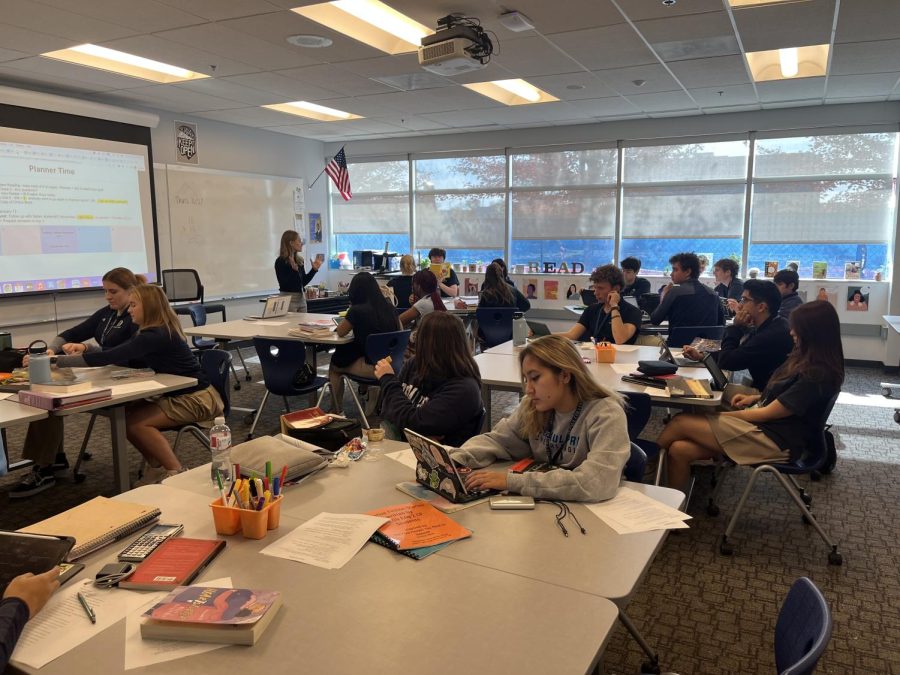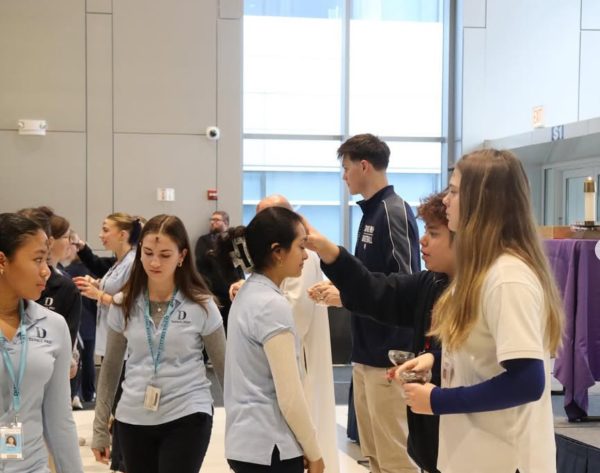AP and IB courses provide challenging academic experiences
Mrs. Bojorges, the IB Literature teacher and IB Program Coordinator, conducts a senior IB Literature course.
AP and IB courses are often viewed as very similar in terms of workload and level of difficulty. While they do have some similarities, they also have their differences, and can be better suited to one student than another. Both AP and IB courses are considered college level, and can be very challenging courses. However, they both offer their own individual benefits.
AP classes are designed to attract students who are looking for a challenge, and are ready for a heavier workload. They have content that is set by College Board, and aim to prepare students for an AP test at the end of the course. Depending on how students score on the AP test, they may be able to earn college credits for their work. They aim to give a deeper understanding of the subject, but their ultimate goal is to prepare students for one final, all-encompassing test.
Paul Sheldon, an AP Language and Composition teacher at DePaul Prep, says that AP classes require “having a system of organization…[and] looking not just at what’s due tomorrow, but mapping out entire units worth of responsibilities.”
Organization is crucial to both IB and AP classes, as the workload can be overwhelming for some students.
According to senior Myles Stewart, the most important skill in an AP class is being able to pay attention to detail.
The workload can be “pretty heavy,” with “less busy work and more detail-oriented assignments.”
In AP Language and Composition, for example, students can expect “one to two hours of homework” between class meeting days. This is similar to an actual college course, where significant effort needs to be put in outside of class time.
Sheldon emphasizes that AP courses prepare students well for college classes, saying that they “bring [students] into the college mindset sooner” than someone who had not taken college level courses in high school. As long as they go into the course “with an open mind” and the understanding that “there’s a lot of work to be done, but if they plan their time out and work with their teachers, they can get great benefits,” students can really get the full benefit of an AP class.
IB, or International Baccalaureate, classes are college level courses that are recognized across the world. The IB program spans 2 years of a student’s schedule, from their junior year to their senior year.
One main advantage of IB classes is the consistency it brings. According to Mr. Spillane, who teaches both AP Human Geography and IB History, the IB program helps students “bond with their classmates in a different way, and they build different and more in-depth relationships with teachers.”
Taking the same course for two years allows students to connect with their peers and reach a “depth and consistency” with the topic that they explore. It also helps with visualizing the future of their time in high school, as knowing they will be in the same course for two years offers consistency.
The course load for an IB course can be challenging because of the amount of content, but time management and organization are key skills.
“As long as you stay on top of everything, they are very manageable courses,” Mr. Spillane says.
In addition, the skills that are required in IB are built in other honors and college prep courses, and the real difference is the quantity of work.
Another IB teacher, Jim Moor, comments that the IB Math course is more of a general overview of a topic. He believes that IB courses should attract students who are good at math, but not looking to pursue it as a career or as a major. For Moore, students looking for a “more complete picture” of math may find AP offerings to be a better fit.
While AP and IB courses are different, they have their similarities as well. Both the AP and IB programs prepare students well for college, and “are definitely good for students to challenge themselves,” says Spillane.
They have similar benefits as well, the main one being preparing students for a college workload and level of learning. They can both be taken individually in one area, meaning students can focus on what they are best at. They can choose a class that they feel will suit them the best based on their skills and interests.
AP and IB courses are college level and highly challenging, but this shouldn’t steer students away.
“The majority of [AP students] come from honors, but that’s not to say that I don’t have a significant minority that come from CP,” Sheldon says.
Overall, the classes are suited to very similar types of students, so choosing between the two is mostly a matter of personal preference.
Mr. Spillane suggests that students interested in either program should “do a bit of research, and see what type of material is covered.”
Anyone interested can find out more about either program by talking to teachers, attending information sessions, and overall deciding what would be their best personal fit.
“I would encourage all students to look into them,” Mr. Spillane says, “as well as being good resume builders, I do think that they make students better learners.”






